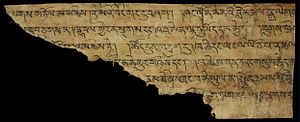- Testament of Ba
-
 Fragment of the Testament of Ba at the British Library, with six incomplete lines of Tibetan writing (Or.8210/S.9498A).
Fragment of the Testament of Ba at the British Library, with six incomplete lines of Tibetan writing (Or.8210/S.9498A).
The Testament of Ba (Tibetan དབའ་བཞེད or སྦ་བཞེད; Wylie transliteration: dba' bzhed or sba bzhed) is an account written in Old Tibetan of the establishment of Buddhism in Tibet and the foundation of the Samye Monastery during the reign of King Trisong Detsen (r. 755–797/804), reputedly as recorded by Ba Salnang (Tibetan དབའ་གསལ་སྣང or སྦ་གསལ་སྣང; Wylie transliteration: dba' gsal snang or sba gsal snang), a member of the king's court. The earliest known versions of the text are two manuscript fragments dating to the 9th or 10th centuries that are held at the British Library.
Contents
Versions of the text
Part of a series on Tibetan Buddhism
History Timeline · Related-topics Schools Nyingma · Kagyu · Sakya · Gelug · Bön · Jonang Key concepts Three marks of existence · Skandha · Cosmology · Saṃsāra · Rebirth · Bodhisattva · Dharma · Dependent origination · Karma Major figures Gautama Buddha · Padmasambhava · Je Tsongkhapa · Dalai Lama · Panchen Lama · Lama · Karmapa Lama · Rinpoche · Geshe · Terton · Tulku Buddhahood · Avalokiteśvara · Four stages of enlightenment · Tantric yoga · Paramitas · Meditation · Laity Changzhug · Drepung · Dzogchen · Ganden · Jokhang · Kumbum · Labrang · Mindroling · Namgyal · Narthang · Nechung · Pabonka · Palcho · Ralung · Ramoche · Sakya · Sanga · Sera · Shalu · Tashilhunpo · Tsurphu · Yerpa Chotrul Duchen · Dajyur · Losar · Monlam · Sho Dun Texts Kangyur · Tengyur · Tibetan canon · Mahayana sutras · Nyingma Gyubum Sand mandala · Thangka · Ashtamangala · Tree of physiology Outline · Comparative studies · Culture · List of topics · Portal
The Testament of Ba was transmitted in manuscript form over many centuries, and so there are many different recensions of the text, but not one single, canonical printed version.[1] Two early versions of the text have been identified by scholars:
- A manuscript in 31 folios discovered in Lhasa in 1997, titled Dba' bzhed (with a 'd' prefix to the Ba clan name), that is thought to be a revised copy of an 11th century manuscript, and which was published in facsimile with an English translation in 2000;[2]
- Three manuscripts titled Sba bzhed (with an 's' prefix to the Ba clan name), one of which dates to the 12th century, that were used as the basis of an edition published in Beijing in 1980.[1]
The Testament of Ba is also widely quoted in later Tibetan historigraphical works, for example the Scholar's Feast (mkhas pa'i dga' ston). The author of the Scholar's Feast calls the Testament the Rba bzhed (with an 'r' prefix to the Ba clan name), and refers to 'genuine', 'impure', 'large' and 'medium' versions of the text.[1]
A later, expanded version of the Testament of Ba, titled Sba bzhed zhabs brtags pa (Supplemented Testament of Ba), was produced during the mid 14th century. A manuscript copy of this text was published with a summary in French by Rolf Stein in 1961.[1]
Up until 2009 it was thought that the Testament of Ba dated back to no earlier than the 11th or 12th century, and therefore its composition may not have been contemporaneous with the late 8th century events that it recorded.[1] However, in 2009 Sam van Schaik of the British Library realised that two Tibetan manuscript fragments catalogued amongst the Chinese manuscripts of the Stein collection (and consequently previously overlooked by Tibetan scholars) preserved a section of the Testament of Ba relating to the arrival of the Indian monk Śāntarakṣita, abbot of Nalanda University, to Lhasa:[3]
- Or.8210/S.9498A (6 lines)
- Or.8210/S.13683 (1 line)
These two fragments came from the 'Library Cave' at Dunhuang, which was sealed in the early 11th century, and so pre-date all of the other known versions of the Testament of Ba. Van Schaik dates the fragments to the 9th or 10th centuries.[1]
The text of the British Library fragments is very close to that of the Dba' bzhed manuscript discovered in Lhasa in 1997, but has some differences that suggest that it represents an earlier recension of the Testament of Ba. Most notably, in the British Library fragments the king is concerened that the foreign monk may have brought evil spirits with him, and so Śāntarakṣita is confined in the Jokhang and interrogated for three months through an interpreter called Ananta. However, the Lhasa manuscript softens the language, politely asking Śāntarakṣita to stay at the Jokhang rather than having him forcibly confined there.[3]
Bibliography
- Stein, R. A. 1961. Une chronique ancienne de bSam-yas : sBa-bzed (édition du texte tibétain et résumé français). Paris: Bibliothèque de l'Institut des Hautes Études chinoises, Textes et Documents.
- Wangdu, Pasang, and Diemberger, Hildegard. 2000. dBa' bzhed: The Royal Narrative concerning the bringing of the Buddha's Doctrine to Tibet. Vienna: Verlag der Österreichischen Akademie der Wissenschaften. ISBN 9783700129561.
See also
- Old Tibetan Annals
- Old Tibetan Chronicle
References
- ^ a b c d e f van Schaik, Sam; Iwao, Kazushi (2009). "Fragments of the Testament of Ba from Dunhuang". Journal of the American Oriental Society 128 (3): 477–487. ISSN 0003-0279.
- ^ Wangdu, Hildegard; Diemberger (2000). dBa' bzhed: the royal narrative concerning the bringing of the Buddha's doctrine to Tibet. Verlag der Österreichischen Akademie der Wissenschaften. ISBN 9783700129561. http://books.google.com/books?id=yEgnAQAAIAAJ.
- ^ a b Van Schaik, Sam (20 November 2009). "The Abbot, or Ironing out History's Wrinkles". http://earlytibet.com/2009/11/30/the-abbot/. Retrieved 2011-01-23.
External links
Categories:- British Library oriental manuscripts
- Historical documents
- History of Tibet
- Tibetan historians
- Tibetan literature
Wikimedia Foundation. 2010.

